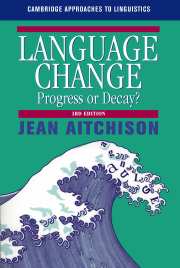Book contents
- Frontmatter
- Contents
- Preface
- Part 1 Preliminaries
- Part 2 Transition
- 4 Spreading the word
- 5 Conflicting loyalties
- 6 Catching on and taking off
- 7 Caught in the web
- 8 The wheels of language
- 9 Spinning away
- Part 3 Causation
- Part 4 Beginnings and endings
- Symbols and technical terms
- Notes and suggestions for further reading
- References
- Acknowledgments
- Index
4 - Spreading the word
From person to person
from Part 2 - Transition
- Frontmatter
- Contents
- Preface
- Part 1 Preliminaries
- Part 2 Transition
- 4 Spreading the word
- 5 Conflicting loyalties
- 6 Catching on and taking off
- 7 Caught in the web
- 8 The wheels of language
- 9 Spinning away
- Part 3 Causation
- Part 4 Beginnings and endings
- Symbols and technical terms
- Notes and suggestions for further reading
- References
- Acknowledgments
- Index
Summary
You know, if one person, just one person, does it, they may think he's really sick … And if two people do it … they may think they're both faggots … And if three people do it! … They may think it's an organization! … And can you imagine fifty people a day? I said fifty people a day … Friends, they may think it's a movement, and that's what it is.
Arlo Guthrie, Alice's restaurantUntil recently, the origin and spread of language change was as obscure to the majority of linguists as the sources of disease still are to some primitive communities around the world. The following is a typical comment by an early twentieth-century writer on the seemingly mysterious origins of sound change:
No records have ever been kept of these first beginnings of regular changes of sound … We know that English wah has changed to waw, and we can give approximate dates for some stages of this process; but we do not know when or where or in whose pronunciation the first impulse towards the change occurred.
This statement was made over eighty years ago. It is still true that, for the majority of past changes, we are unlikely to know who started them, and where they began.
- Type
- Chapter
- Information
- Language ChangeProgress or Decay?, pp. 55 - 67Publisher: Cambridge University PressPrint publication year: 2000



